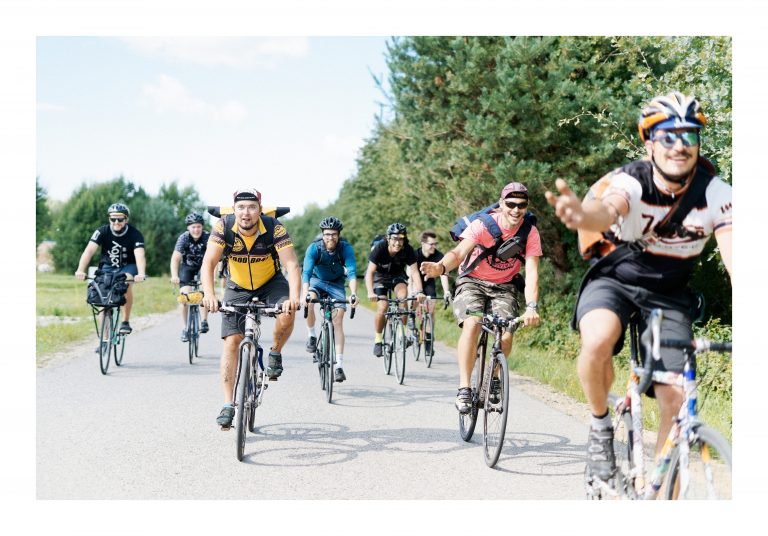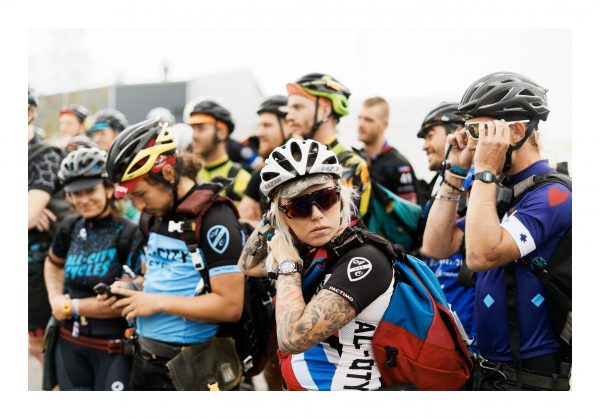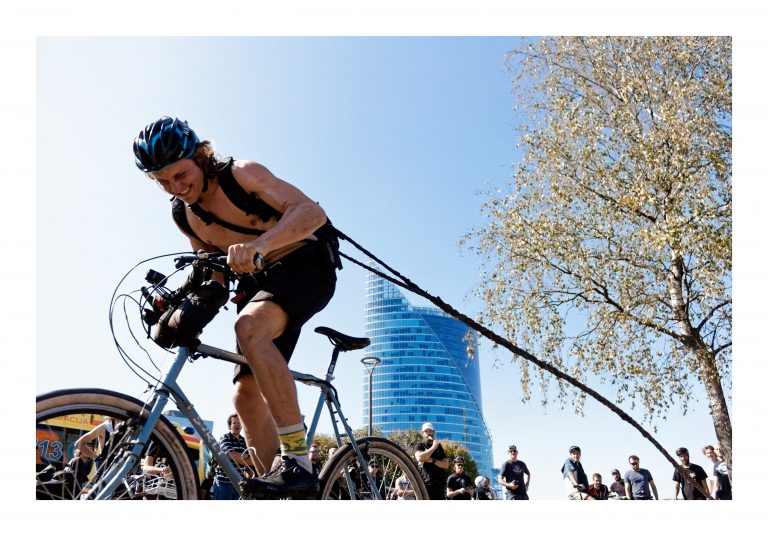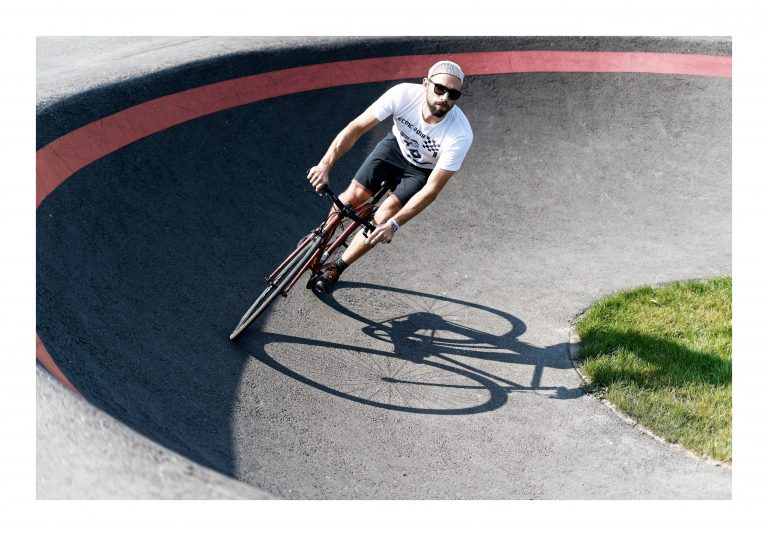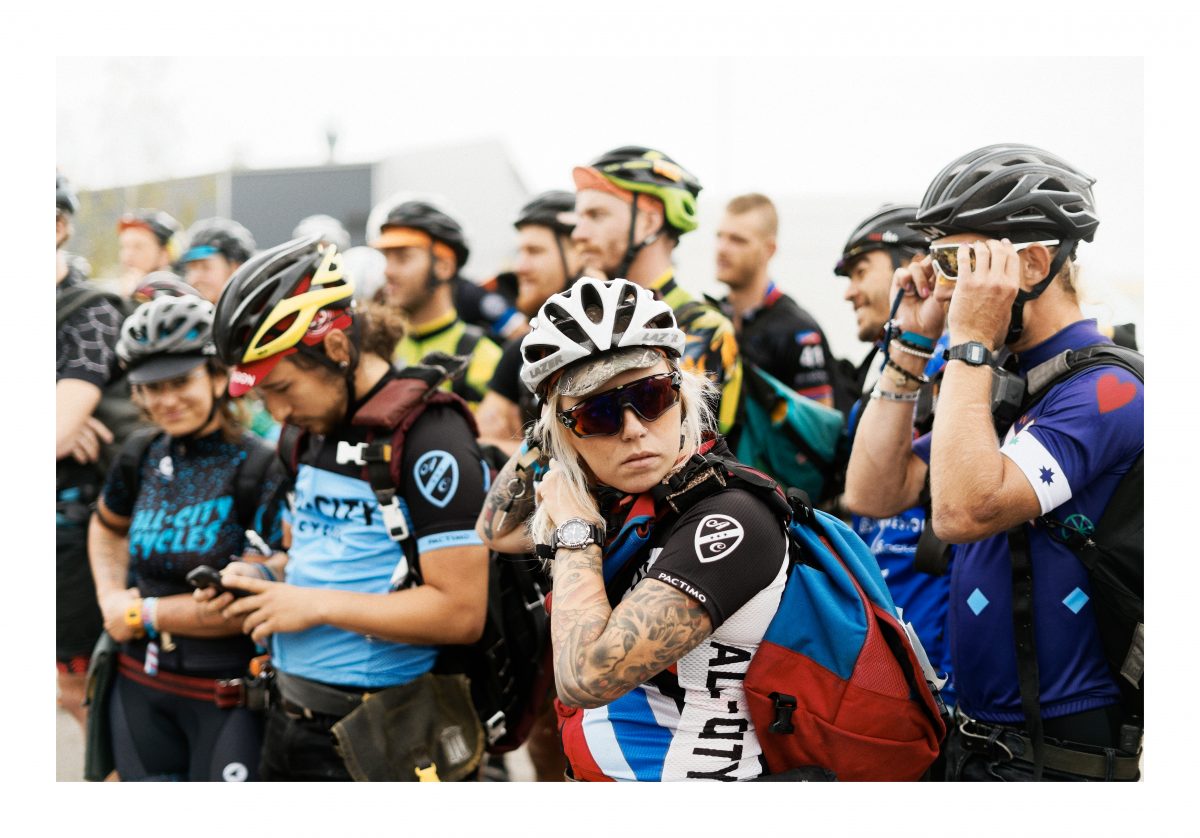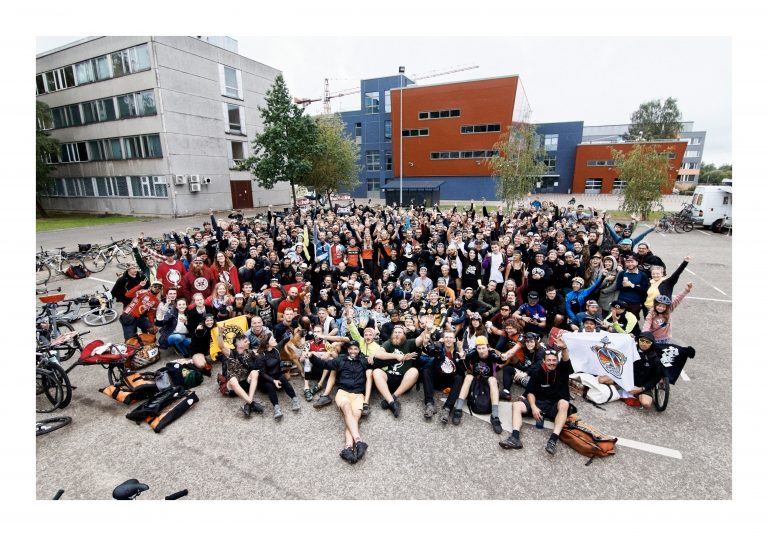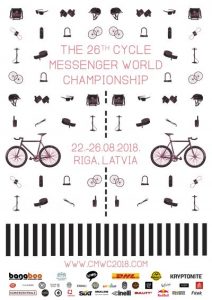 The spraying of sparkling wine from the hands of the newly crowned double-champions Jimmi “Jumbo” Bargisen and Clara “Orca” Felis from the top of the podium marked the official end of the 26th Cycle Messenger World Championships that took place in R?ga, the capital of Latvia, on August 22-26, and the beginning of a lasting set of memories. The friends gained and bonds built during this annual reunification of the messfam, as the messenger community calls itself, are born of a special, Latvian flavour. In total there were 421 registered participants from 45 countries.
The spraying of sparkling wine from the hands of the newly crowned double-champions Jimmi “Jumbo” Bargisen and Clara “Orca” Felis from the top of the podium marked the official end of the 26th Cycle Messenger World Championships that took place in R?ga, the capital of Latvia, on August 22-26, and the beginning of a lasting set of memories. The friends gained and bonds built during this annual reunification of the messfam, as the messenger community calls itself, are born of a special, Latvian flavour. In total there were 421 registered participants from 45 countries.
By DWI
Day 1: Really long group ride and the secret bonfire party
The Worlds started on Wednesday, August 22 with registration at the Autentika, the location of forthcoming parties, and the start of the 138 km long, 80 strong group ride to Saulkrasti, a calm coastal town stretched along the Gulf of Riga. They wanted not only to explore various Latvian landscapes and bumpy paved and unpaved roads, but also to meet around 110 ‘polar pirates’ from the official pre-event held in Helsinki, Finland. The Pirates had already been riding for two days from Tallinn to Parnu, and then to Limbaži, enjoying or suffering different weather conditions. During the technical breaks, the Riga party was entertained by Frenchman Clément Leroy with his trick-show. In Saulkrasti, the whole group took a rest, visited the Saulkrasti Bicycle Museum and spent a lot of time at the sandy beach. After the technically challenging ride to Saulkrasti, especially for the owners of narrower tires, the combined parties prepared for the roadtrip to R?ga. This entailed the stuffing of their collective faces with local fruits, cucumbers, buns from Canelle Bakery and a meal made by the German messenger Ali and his mates. During the way home the group split into several smaller groups that finished the ride around 7.30 PM.
The first day wasn’t over. Even the most tired messenger managed to find the right location of the secret party in the very southern tip of the Lucavsala Island in the middle of the River Daugava. A bonfire made by the Velokurjers, the local messenger company that organized the Worlds, and beer warmed the hearts and loosened the tongues of those who had come.
Day 2: Side-events on the AB dam and the main alley cat
Not everyone could enjoy the previous night so completely as a bunch of side events organized by the local Tru Fix Kru started at 11am the next morning on the AB Dam in front of the distinctive panorama of Riga’s Old Town. Side-events were kicked-off with sprint races, which were held in separate heats from the first round to the finals, where two Russians Nikita Semenikhin (OPEN category, Petushki-Slabachki) and Viktoria Vasileva (WTF category, AltSpace) were the fastest and the bravest sprinters. Unfortunately, paramedics couldn’t enjoy the sunny day calmlessly. Yes, this race was not only about making the highest speed but also for the best braking in order to avoid crashing a fence at the finish and falling into the River Daugava (a sole participant almost landed that trick).
For the first time in the CMWC history a rubber pulling event took place. Though more than 100 messengers had been registered for this unknown event, only around 25 dared to pull the wire made of old bicycle tyres as far as possible while staying in the saddle. The longest distance was achieved by Laura Galvez (Colombia) and Michael Mang (VeloKurier Freiburg, Germany).
The competition in side-events went on with a track stand, backward circles, tricks and footdown. In both categories the track stand competitions were really close and the endgame started when competitors were told to make moves, such as taking one and then both hands off the handlebar, then going further and doing the same with their feet. In the WTF category Anamaria Duarte Gelvez (Colombia) and Liisa “Kiddo” Frang (Sweden) got a split 1st place. Meanwhile, the OPEN competition was so intense that three best finalists had to rematch to find a clear winner, Keven Escamilla (Slow Squad International, USA), who also won at footdown, another competition which requires a high degree of balancing skill. Lisa Kromm (Kollektiv Kirschgrün, Germany) was the last survivor of footdown race among the WTF riders.
There weren’t so many people who wanted to participate in backward circles, though, Clément Leroy (Team Saucisson, France) and Kim van Dyk (the Netherlands) made the highest numbers. Unfortunately, no WTF competitors were eager to show some tricks, but Hibatul Rama Haqqi (BidonesiaxKamiantarJkt) from Jakarta, Indonesia, which will host the next CMWC, got the loudest ovations for his jumping tricks.
At around 7 PM, a crowd of around 200 messfam members gathered around a huge empty flagpole to hear directions for the long-waited alley catrace. Toms Alsbergs, the leader of Tru Fix Kru, informed the competitors that the first task was to get the manifest at the base of the highest building in Riga. The racers started the alley cat by running a 200 meter-long sprint to their bicycles and then pedalling to the Riga TV tower, located on Za?usala Island. However, some racers were confused about the definition of a building and went to the wrong place – the competition was over for them from the very beginning. Meanwhile, the others had gotten the manifests, and were tasked to find the 8 checkpoints and to do some extra tasks, including catching a moving checkpoint and buying a carrot with leaves. Checkpoints were located at various places: the highest point in the city (though Dzegužkalns with at 32 m above sea-level is not such a serious challenge), Labietis brewery, and a very remote Motor Museum. The winners turned out be to the locals, both experienced alley cat riders. Reinis “Rausis” Avens (AVE Kurjers, R?ga) with his lucky number 333 won by a 5 minute margin, meanwhile L?ga Pakalna was the fastest among the WTF racers.
The location of the finish and the following party was Br?klene Bike Shop, the headquarters of Tru Fix Kru. Besides singing karaoke, arm-wrestling and enjoying the official CMWC 2018 beer, brewed by Al??mi?is, the party spread out to Barona street, where, in the middle of the street, Lucas Brunelle, the well-known cycling film director, and Jordanas “Jordan” Grizevicius, a Lithuanian messenger based in London, competed in a raw egg eating game while a police van cruised by! The municipal police presence persisted and eventually slowed the outside party.
Day 3: Pump-track and catamaran race
The Friday programme started with the Open forum where the bidding cities for CMWC 2020 – Basel (Switzerland), Yokohama (Japan) and Bogota (Colombia) – presented their vision and plans. All the CMWC participants got a ballot to vote for their favorite. The vote for the next ECMC took place as well. The decision was made that Brussels (Belgium) would host.
In the very central Centre Sports Quarter, the recently built pump-track was shining. Many wanted to see it, not so many were brave enough to compete in/against it. The pump–track races were held in two technical categories: freewheel and fixed. As many people expected, the pump-track left some traces, 11 people visited paramedics because of more or less severe scratches. If in the heats before the finals the racers faced each other in the track, the winners were decided by a time trial. By a few tenths of a second, Nino Clusos (Urban Cycle, France) managed to capture the victory in the freewheel category over the local favorite Jur?is Bu?s (AVE kurjers, R?ga), whose efforts with a BMX bicycle weren’t enough. Among WTF riders, the fastest one turned out be Nino’s teammate Carole “Krole” Lecuiller.
In the fixed bicycle category, Ksenia Kirilova (Petushki-Slabachki, Russia) and Nicolas Daumin (Eagles Courses) where the best riders.
After the pump-track, the messfam started to move towards the Old Town, where the City Canal awaited for the catamaran race, another CMWC first. Many participants had been curious about it before the championships and finally they could find out that these catamarans are quite slow pedal-powered boats (also called ‘pedalo’). The event was a team-based competition of mostly two or three members on deck per boat. The race attracted many more people than the organizers had expected so the number of participants climbed up from the original 24 to 48 teams. The fastest time (3:59 minutes) was set by Team Zozh from Russia (Anton & Daniil), who were a bit quicker than the German team Fahrwerk (4:02; Paul & Simon). Two teams, Bidon (Ivan, John and Jeanne) and Cheetah (Johanna and Lydia) got a split 3rd place (4:05).
Meanwhile, some guys had taken the Velokurjers’s challenge seriously and were swimming naked in the Canal, that led to some conversations with the water policeman, who seemed really entertained.
Participants luckily avoided a thunderstorm that suddenly approached the city, but what they couldn’t avoid was the dilemma between two tempting night options. Either go to Autentika for a Lucas Brunelle film screening (eventually, only one film was screened, because of the weather) and party, or participating in weekly Nightride to join locals that seek joy in wandering around the city by bike for around 3 hours to enjoy empty streets and more distant neighbourhoods via a slow-pace group ride.
Day 4: Main race qualifiers and cargo race
On Saturday morning the whole pack showed on ??psala Island, at the R?ga Technical University (RTU) campus where the main events were to commence. While organizers were still building the race course, which mainly consisted of one-way streets and pedestrian zones forming a maze around the RTU buildings, the participants had already started exploring all the details of the area.
When the 12 checkpoints (Bagaboo, Project Basel 2020, Kryptonite, Colombia CMWC 2020, Vote for Yokohama 2020, RTU, Velokurjers, Gay’s OK, Knog, DHL, CMWC Jakarta 2019, and KurierZentrale) were installed, and the participants of the first heat ready, the qualification to determine the 100 participants for the main race finally started. The hour-long task consisted of two manifests, each including two blocks with several jobs. After the first manifest was done, participants had to hand it in at the start point to get the next one. The idea of all the tasks was the same for all the heats; however, the checkpoint choice and/or order was different. At the majority of the checkpoints volunteers only stamped the manifests, but at some of them messengers could also get tangible deliverables, including a shoe-box and a water bottle. Volunteers also kept track of whether or not participants were following the general rules while also noting that their behaviour was indeed civil. After the fourth heat, organizers had 266 manifests to check.
There were some delays during the programme, so the two hour-long cargo race started at only 8 PM turning it into a night competition. The participants had to compete not only against each other, but also against the rain, which emerged in all possible strengths ranging between light drizzle and heavy pour. Some manifests were destroyed or totally wet before their owner even reached the first checkpoint. In total, there were 4 blocks plus extra jobs, that included picking-up and dropping-off a big pallet or a big blue barrel (maximum three times each). The last block opened only after an hour and requested to take as many deliverables as possible, but racers should have kept in mind that the real deliverables had specific values (points) according to their shape and weight. It was a fun and challenging task for participants (and for spectators as well) to move a 25 liter bucket full of water, a massive 2,5 m long pallet, car tyres and raw eggs. After the finish, the cargo race planner J?nis “Nereta” Belecks took care about the handled manifests by taking them home and drying carefully. At the end, it turned out that Jimmi “Jumbo” Bargisen (By-Expressen, Copenhagen, Denmark) was the most successful cargo messenger with 93 points, followed by his countryman and teammate Lasse “Hestearm” Kofod (90.6 points) and the Latvian messenger Otto Pirtnieks (Velokurjers, R?ga) with 85 points. Clara “Orca” Felis (Hermes, Vienna, Austria) triumphed in the WTF category, scoring 82 points. She was followed by two Germans Katja “Kat” Shaisi (73.5 points, Needle and Spoke Collective) and Johanna Reiser (41.2 points, FKK).
After the cargo race finish, participants moved to Autentika to enjoy a party with live music and to participate in the goldsprint event. The fastest in the distance of 250 m was Peter de Winter (Tour de Ville, Eindhoven, the Netherlands) and Viktoria Vasileva. Around midnight either joy or disappointment, expected or unexpected, started to decorate messengers’ faces since they had finally found out the qualification results determining whether they could focus on partying hard or get some rest before the big finals… or vice versa.
Day 5: The main race finals, OOT alley cat and the awards ceremony
Almost 100 finalists gathered in the main race headquarters to hear the specific rules of the most important event of the CMWC: the main racethat should distinguish the fastest, smartest and most efficient bicycle messengers in the world. The race consisted of three rounds. After each round half of the participants in both categories were eliminated, so only 50 and 25 racers were supposed to get the third and fifth manifest, respectively.
At 1.20 PM the race started with a rush for their bikes. The participants now were much more careful in reading the manifests in full in order to avoid unnecessary visits of checkpoints. There were some extra rules included in the main race task. A single checkpoint was guarded by a security guard who requested that participants show an ID that should have been received, filled and stamped during the race and to sign a log book. There was a mandatory 10 minute-long lunch break, where racers could do anything they wanted to but see their manifests, a 10 minute break that, for some, seemed like hours.
The fourth and the fifth manifests resembling a maze with many must-visit dead-ends, were real mind twisters. During the final manifest, the racers were supposed to find and deliver a wooden strawberry box and a cardboard box, these items were allocated only in limited number. At the finish, it was clear that the same winners as in the cargo race were in the lead, so Clara (finished in 2 hours 17 minutes) and Jimmi (2 hours 4 minutes) became double-champions. Lisa Kromm (2 hours 22 minutes) and Nicklas “Barkis” Barklund (2 hours 9 minutes; Crosstown, Sweden) followed them. The third place was captured by both CMWC 2017 champions: Cecile Bloch (2 hours 26 minutes; Omniumzoomlife, France) and Johannes “Jojo” Killisperger (2 hours 10 minutes; By-Expressen, Copenhagen, Denmark).
As soon as the main race was over, all the messfam gathered for a group photo. The * (star) BMA meeting took place afterwards, followed by an out-of-towner alley cat, planned as a rushy sightseeing tour on both banks of the River Daugava. The winners were Anton Benedix (ImNu KurierKollektiv Dresden, Germany) and Emma Missale (UBM, Italy). However, the rider who had the most memorable time was surely Nicolay Milovidov (MOSKOVSTYLE, Moscow, Russia), who indeed was born under a lucky star as he survived a crash with a public bus only with a few scratches. Although his bike that went under the bus was completely destroyed, the lucky Russian managed to find another bike to continue the race.
The award ceremony was held in the yard of Autentika, the location of the wild parties of previous nights. The location of CMWC 2020 was officially announced, and the Colombian crew, and everybody else were happy to hear that Bogota will host the championship in 2020.
In the ceremony, Allan Shaw (By-Expressen/GAY’S OKAY, Denmark) and Emma Missale were named as the nicest messengers in the eyes of volunteers and organizers. Jumbo in his winners’ acceptance speech revealed that he had been competing for the title for so many years, but never had made it. He told everyone that he’s wearing a race jersey of Deadline, a messenger company that had ceased to exist 10 years ago. Clara thanked all the volunteers, organizers and other participants for the unforgettable CWMC. All the winners received special prizes from the sponsors (Kryptonite, BagaBoo, Knog, Cheezy, Cinelli, Wadex, 8bar, Trash Bags, WESTBIKE, N E W _ P H A R A O H, Black Spoke Collective St. Pauli, Bum Bag, LCEF, ilsdvsn industries, Raval).
Organizers say a huge thank you to all the sponsors and partners who supported the CMWC 2018 – Velokurjers.lv, DHL Express Latvia, Red Bull, Autentika, Karšu izdevniec?ba J??a s?ta, GAY’S OKAY, Pelago, Long Chips, Riga Technical University, Tru Fix Kru, Shop Br?klene, Omniva, Fitek, KurierZentrale, Bullitt, Cannelle Bakery, Colortime videography.
The CMWC 2018 in Riga was indeed a special event that will survive forever in the memories of its cherished participants. See you at the next CMWC 2019 in Jakarta, Indonesia!
Photo: J?nis Pipars (https://www.janispipars.lv)
Here you can download and view all photos: https://www.flickr.com/photos/159292732@N07/albums

